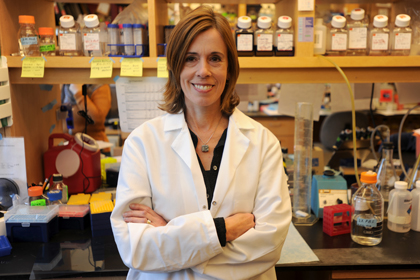Researcher Studying Antioxidants in Lung Disease Earns Outstanding Investigator Award
Written by |

Yvonne Janssen-Heininger, PhD. Photo credit: Larner COM Design & Photography
A University of Vermont medical professor has won a $6.3 million award to study antioxidant therapy as a possible treatment option for those with lung diseases such as pulmonary fibrosis (PF) and asthma.
The National Heart, Lung, and Blood Institute (NHLBI) gave its first Outstanding Investigator Award to Yvonne Janssen-Heininger, PhD, a professor of pathology and laboratory medicine at the University of Vermont’s Larner College of Medicine.
The award is “designed to promote scientific productivity and innovation by providing long-term support and increased flexibility” to those who do heart, lung and blood research, the institute said. It will be spread over seven years.
“I’ve devoted my entire career to antioxidant-related research,” Janssen-Heininger said in a press release.
Her team studies the actions and interactions of antioxidants, which play important roles in remodeling lung tissue in pulmonary fibrosis, asthma, and chronic obstructive pulmonary disease (COPD) patients. Each of these diseases is characterized by lung tissue scarring, which prevents an adequate flow of oxygen to the lungs.
Their recent research has revealed that oxidants can change chemical messengers’ functions in lung cells.
They have also found that the antioxidant glutathione can combine with lung tissue in a process known as S-glutathionylation that leads to scarring.
“Glutathione is an antioxidant molecule, traditionally thought to be good for you,” Janssen-Heininger said. Now “we believe it is actually relevant to the development of a scar.”
The team wants to understand how the S-glutathionylation process works and to discover whether enzymes regulating oxidants can be targeted to fight tissue-fibrosis development. Their ultimate hope is that their research leads to therapies that prevent scarring.
“Our field has been turned upside down in recent years,” Janssen-Heininger said. “While originally oxidants were believed to be ‘bad guys,’ it turns out that oxidants may work in a very different way to cause disease. Similarly, some antioxidants that are generally believed to be ‘good guys’ may in fact contribute to disease in a surprising manner.”
Janssen-Heininger has received two patents for her work with the oxidant-controlling enzyme glutaredoxin. One focuses on glutaredoxin’s possible use as a lung-disease therapy. The other focuses on its possible use as a diagnostic tool for detecting oxidized proteins.







